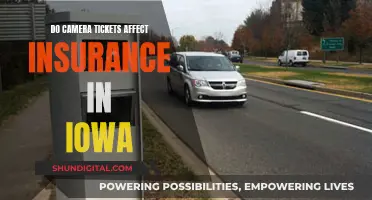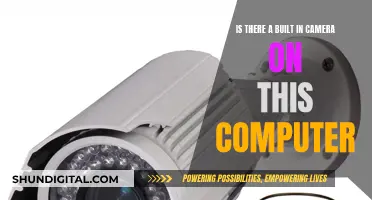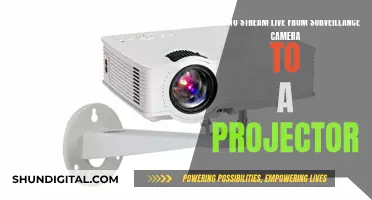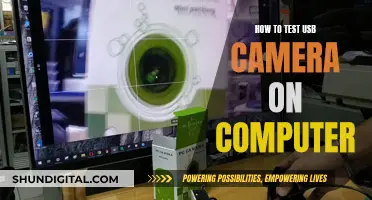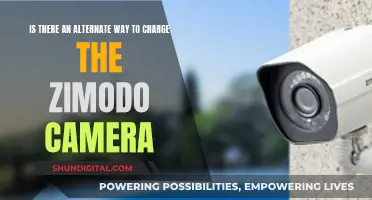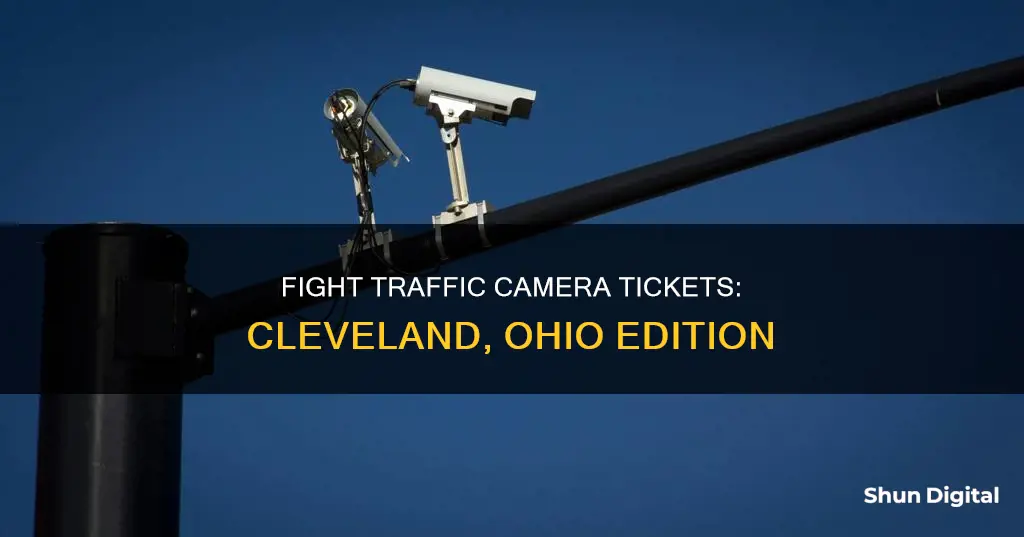
Traffic cameras in Ohio have been the center of controversy for more than a decade. While they are still legal in the state, with a few exceptions, their use has been declining due to legislation that made them less financially viable for local governments. In Cleveland, residents voted for a charter amendment in 2014 that prohibited the use of traffic cameras. However, some suburbs in Greater Cleveland, such as Parma, Walton Hills, and Mayfield Village, continue to use them. If you receive a traffic camera ticket in Cleveland, Ohio, you have several options, including paying the penalty, providing information on who was driving the vehicle, or requesting to challenge the ticket before a hearing officer.
| Characteristics | Values |
|---|---|
| Location | Cleveland, Ohio |
| Traffic Camera History | In 2014, the Ohio General Assembly approved legislation that would require a law enforcement officer to be stationed at each traffic camera location. The Ohio Supreme Court struck down the law in 2017, but many municipalities had already removed the cameras. |
| How Traffic Cameras Work | Traffic cameras detect various traffic violations, such as speeding, running red lights, or the unauthorized use of bus lanes. |
| Types of Traffic Cameras | Two main types: mounted next to or over the road or placed inside a law enforcement vehicle; and speeding and red light cameras, which are automated. |
| Resolving a Traffic Camera Ticket | Three options: pay the penalty online or by mail within 15 days; provide information on the driver within 15 days; or request to challenge the ticket before a hearing officer within 15 days. |
| Appealing a Traffic Camera Ticket | The driver must pay the citation fee before the due date and attend an appeal hearing. If the hearing officer finds in favor of the driver, the fee is refunded. |
| Hearing Appearance | Appearing at the hearing may increase the chances of beating the ticket, especially if the issuing officer does not show up. The driver should dress appropriately and remain respectful and calm when explaining their case. |
| Impact of a Camera Citation | A camera citation is not a traffic violation, but failing to pay it can result in debt collection and negatively impact the driver's credit score. |
What You'll Learn
- Know your rights: Traffic camera tickets are civil violations, not traffic violations
- Check the law: Ensure the camera was used legally—cities must post signs warning drivers
- Challenge the ticket: Request a hearing, and the ticket may be dismissed if the officer doesn't show up
- Fight in court: Dress appropriately, remain respectful, and calmly explain your case
- Ignore at your own risk: Unpaid tickets can be sent to collections and may hurt your credit score

Know your rights: Traffic camera tickets are civil violations, not traffic violations
If you've received a traffic camera ticket in Cleveland, Ohio, it's important to know your rights and understand the process for resolving the violation. Here's everything you need to know about traffic camera tickets as civil violations, not traffic violations:
First and foremost, it's crucial to understand that traffic camera tickets in Ohio are considered civil violations, not criminal or traffic violations. This distinction is important because it means that these tickets are handled differently from traditional traffic tickets. While a traffic violation would go on your driving record and could result in points against your license, a civil violation does not carry these same consequences. Instead, a civil violation is similar to receiving a parking ticket.
In the context of traffic camera tickets, a civil violation means that the ticket is issued to the owner of the vehicle, regardless of who was driving at the time. This is a key difference from a traffic violation, where the ticket is typically issued to the driver. As a result, the vehicle owner is responsible for resolving the ticket, even if they were not the one driving when the violation occurred.
So, what are your options if you receive a traffic camera ticket in Cleveland, Ohio? You generally have three choices:
- Pay the penalty: You can choose to pay the fine associated with the ticket. In Ohio, you typically have 15 days to pay the penalty online or by mail. Ignoring the ticket is not a good idea, as it can result in additional late fees and collection actions, which could negatively impact your credit score.
- Provide driver information: If someone else was driving your vehicle at the time of the violation, you can provide this information to the relevant authority within 15 days, along with a notarized affidavit. This shifts the responsibility for the ticket to the actual driver.
- Challenge the ticket: You have the right to challenge the ticket and request a hearing. This must also be done within 15 days of receiving the ticket. During the hearing, you can present your case and dispute the violation. If you choose to go to court, make sure to dress appropriately and remain respectful towards the hearing officer.
It's important to note that even though a traffic camera ticket is a civil violation, failing to take action on it can still have consequences. If you simply ignore the ticket, it could go into collections as unpaid debt, which could hurt your credit score. Therefore, it's in your best interest to address the ticket promptly, either by paying the fine or challenging it in court.
Lastly, keep in mind that the laws and procedures surrounding traffic camera tickets can vary by city and state. While the information provided here is specific to Cleveland, Ohio, be sure to review the relevant laws and regulations in your area to fully understand your rights and responsibilities.
ONA Camera Bags: Where Are They Made?
You may want to see also

Check the law: Ensure the camera was used legally—cities must post signs warning drivers
If you've received a traffic camera ticket in Cleveland, Ohio, it's important to understand your rights and options. One key aspect to consider is whether the camera was used legally. Here's a detailed guide to help you navigate this process:
Understanding the Law on Traffic Cameras in Ohio
In Ohio, the use of traffic cameras is legal, but there are specific requirements that cities must adhere to. The most crucial aspect is signage. Cities are required to post signs that notify drivers of the presence of traffic cameras before they reach the intersection or area being monitored. This means that if you receive a ticket from a traffic camera in an area with no visible warning signs, you may have grounds to dispute the citation.
It's important to note that the Ohio Supreme Court has been actively involved in cases related to traffic camera laws. While the court struck down certain restrictions in 2017 and 2018, it also upheld a 2019 law that reduced state funding for communities using traffic cameras. This back-and-forth legal battle highlights the ongoing debate surrounding the use of traffic cameras in the state.
Verifying Signage and Notification
To ensure that your rights are protected, you can take the following steps:
- Review the Location: Visit the intersection or area where the traffic camera is located. Look for signs posted by the city that specifically warn drivers about the presence of traffic cameras. These signs should be clearly visible and placed before the monitored area.
- Document the Evidence: If you believe that there are no warning signs or the signage is inadequate, gather evidence to support your claim. Take photographs or videos of the area, capturing the absence of warning signs or any signs that are obstructed or difficult to see.
- Research Local Ordinances: Check the local ordinances or regulations for the specific city or municipality where you received the ticket. These ordinances may provide additional details on the requirements for signage and notification.
- Consult an Attorney: If you're unsure about the legality of the traffic camera, consider consulting a traffic ticket attorney or a civil rights attorney specializing in cases related to traffic camera citations. They can provide personalized advice and help you understand your legal options.
Remember, while fighting a traffic camera ticket can be a complex process, it's important to know your rights and ensure that cities are adhering to the law. By checking for proper signage and notification, you can make an informed decision about how to proceed with your citation.
Focusing on the Right Things: Choosing Your Camera Focus
You may want to see also

Challenge the ticket: Request a hearing, and the ticket may be dismissed if the officer doesn't show up
If you've received a traffic camera ticket in Cleveland, Ohio, you may be able to challenge it by requesting a hearing. This is one of the three options available to you for resolving a traffic camera citation. The other two are paying the penalty or providing information on who was driving the vehicle (if it wasn't you).
If you want to contest your ticket, you must request a hearing within 15 days of receiving the citation. At the hearing, a hearing officer will review your case and determine whether an infraction occurred. It's important to note that you must still pay the $85 citation fee before the notice's due date to appeal the ticket. If the hearing officer finds in your favour, you will get your money back.
Attending the hearing in person can improve your chances of beating the ticket. It's also important to dress appropriately and remain respectful towards the hearing officer, avoiding any displays of anger or frustration. Instead, calmly explain why you believe you are innocent of the infraction.
Keep in mind that if you choose not to challenge the ticket and simply ignore it, it could go into collection as an unpaid debt, potentially affecting your credit score. While there may be no immediate repercussions, such as the suspension of your driver's license, it's best not to take the risk.
Testing Your Computer's Camera and Microphone: A Quick Guide
You may want to see also

Fight in court: Dress appropriately, remain respectful, and calmly explain your case
If you want to fight a traffic camera ticket in court, there are a few things to keep in mind. Firstly, your physical appearance in court matters. While it may not change the specifics of your case, dressing appropriately can leave a good impression and signal that you are taking the matter seriously. Avoid dressing down and always opt for a respectful and professional look.
Secondly, your demeanor in court is crucial. It is important to remain respectful and calm throughout the hearing. Avoid getting angry or frustrated, even if you disagree with something that is said. A respectful and calm attitude can positively impact the hearing officer's perception of you.
When explaining your case, stay calm and stick to the facts. Clearly and concisely explain why you believe you are innocent. Be prepared to provide evidence or arguments to support your claim. Remember, the hearing officer will consider not just the facts of the case but also your attitude and behaviour during the hearing.
While fighting a traffic camera ticket in court can be daunting, keeping these tips in mind can help improve your chances of a favourable outcome. Remember, it is your right to explain your side of the story, and remaining respectful and calm will leave a good impression on those involved in the decision-making process.
Computer Camera Showing Red: What's the Issue?
You may want to see also

Ignore at your own risk: Unpaid tickets can be sent to collections and may hurt your credit score
While it may seem like a good idea to ignore a traffic camera ticket, it's important to remember that there can be serious consequences for doing so. In Ohio, traffic camera tickets are considered civil violations, which means that they can be sent to collections as unpaid debts if they are not paid or otherwise addressed. This can have a negative impact on your credit score, affecting your ability to make large purchases, rent an apartment, or even just take out a loan.
The consequences of ignoring a traffic camera ticket can be significant. While it may seem like a minor infraction, failing to take action can result in a default judgment against you. This means that the city will win by default, and the unpaid ticket will be sent to collections. Not only will this hurt your credit score, but it can also make it difficult to dispute the ticket in the future.
Additionally, the financial burden of ignoring a traffic camera ticket can increase over time. In Ohio, a $25 late fee is added to the fine for defaulting on a ticket. If you ignore the ticket, you will be responsible for paying the original fine, the late fee, and any additional fees associated with collections. These fees can add up quickly, and the longer you wait to address the ticket, the more expensive it will become.
It's also important to note that while traffic camera tickets in Ohio are civil violations and do not result in points on your driving record, they can still have an impact on your driving privileges. If you accumulate multiple unpaid tickets, you may find yourself facing a suspension of your driver's license or even arrest. This can obviously cause significant disruptions to your daily life, especially if you rely on your vehicle for work or other essential activities.
Finally, ignoring a traffic camera ticket can also impact your insurance rates. While a single ticket may not affect your insurance, multiple unpaid tickets or a pattern of reckless driving can result in increased insurance premiums. This is because insurance companies view individuals with multiple traffic violations as higher-risk drivers, and as a result, charge higher rates to offset the perceived increased likelihood of claims being made.
In conclusion, while it may be tempting to ignore a traffic camera ticket, it is important to remember that doing so can have serious consequences. Unpaid tickets can be sent to collections, negatively impacting your credit score and financial health. Additionally, the financial burden of ignoring a ticket can increase over time, and multiple unpaid tickets can affect your driving privileges and insurance rates. It is always best to address traffic camera tickets in a timely manner to avoid these potential pitfalls.
Caring for Your Camera: A Guide to Maintenance and Storage
You may want to see also
Frequently asked questions
You can either pay the penalty online within 15 days, provide information on who was driving the vehicle (if not you) within 15 days, or request to challenge the ticket before a hearing officer within 15 days.
If you ignore the ticket, you will receive a $25 late fee and a default notice. If you don't respond to the default notice, the unpaid citation will go into collection.
While you can choose to ignore the ticket, you may be summoned to small claims court if you receive multiple tickets and don't pay them.
You can request a hearing to challenge the ticket within 15 days of receiving it. At the hearing, present your case calmly and respectfully to the hearing officer, who will decide whether to uphold or dismiss the citation.
Ignoring a traffic camera ticket can result in a late fee, collection efforts, and potentially negative impacts on your credit score. However, it is unlikely to affect your driver's license or result in an arrest.


